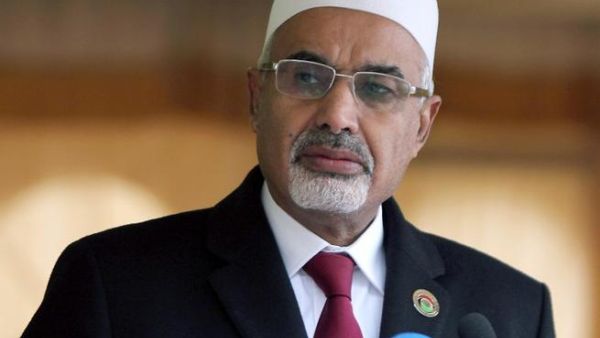The President of Libya’s General National Congress Mohamed Magarief submitted his resignation on Tuesday as a result of the passing of a controversial law banning all those who worked in senior posts with Gaddafi’s regime.
Critics of the so-called ‘political isolation’ law say it is unconstitutional, but Mr. Magarief said in a speech at a plenary session of the General National Congress that he was stepping down in complying with it.
He also called on all others to do the same saying that “everyone must obey the law out of respect for legality and democracy," Magareif said at a plenary session of the General National Congress.
In the televised speech Magarief confirmed rumors circulating in Libya for some time that decisions in the National Congress were passed under intimidation and threats by those members who were members of armed groups and who used their military power to pressure their colleagues to vote for certain laws or decisions.
Mr. Magareif expressed his rejection of the bullying by some members of the National Congress of their colleagues and imposing of certain decisions in one direction or another.
He said “I cannot understand or accept that a number of members of the National Congress, who were among the ranks of the true revolutionaries who chose to join the political process, and entered the general national elections and who presumably accepted the democratic process, to use their affiliation with revolutionary brigades and regional loyalties to intimidate their colleagues in the Congress and pressure them to vote in one direction or another.”
“These practices are inconsistent with most basic principles of democracy that each member has one vote pursued by logic and evidence rather than by the threat of arms and the bullying that is coming from outside of the Congressional Hall,” he added.
In his speech, Magarief also condemned the illegal practices committed by armed groups saying that attacks on innocent people, arbitrarily imprisonment, torture, extortion, killings as well as the abuse of public funds and attacks on public and private properties are all not of revolutionary morals at any phase.
Magarief also criticized the state of the Libyan media which according to him have taken a wrong turn that will not help in the rebuilding of new Libya.
Under the slogans of freedom of expression there emerged written, radio and TV channels that are funded by corrupt money, and the back of the media to say the least, it is incontinent, irresponsible, driven by personal, partisan and tribal conflicts, Magarief stressed.
He said such media has been playing a dangerous role by hiding the truth from the citizens, misleading them and in the process they created chaos, confusion, suspicion, frustration and resentment among the public that led them to decline political participation or at worse act against the legitimate state and against the national interest.
He warned that the continuation of the Libyan media on this course will have the worst consequences on the country.
Mr. Magarief was elected as president of the Libyan National Congress in August after the first national elections that took place on 7 July 2012.
An economist and former ambassador to India under Gaddafi, Magarief was born in 1940 in the eastern city of Benghazi. He spent 31 years in exile, including 20 years as a political refugee in the United States after he founded an opposition group, the National Front for the Salvation of Libya, in the early 1980s aimed at toppling the dictator Gaddafi from power.
In exile, Mr. Magarief was hunted by Gaddafi's intelligence services, who launched a three-decade campaign to liquidate opponents of the regime.
"I place my resignation in your hands. I leave with my head held high and my conscious clear," he said at the end of his speech.
Congress spokesman Omar Hmaidan told reporters Magarief's first deputy Giuma Attaiga would be acting congress president until an election for a successor was held. Diplomats in Tripoli said it was still too early to identify any frontrunners.
--








